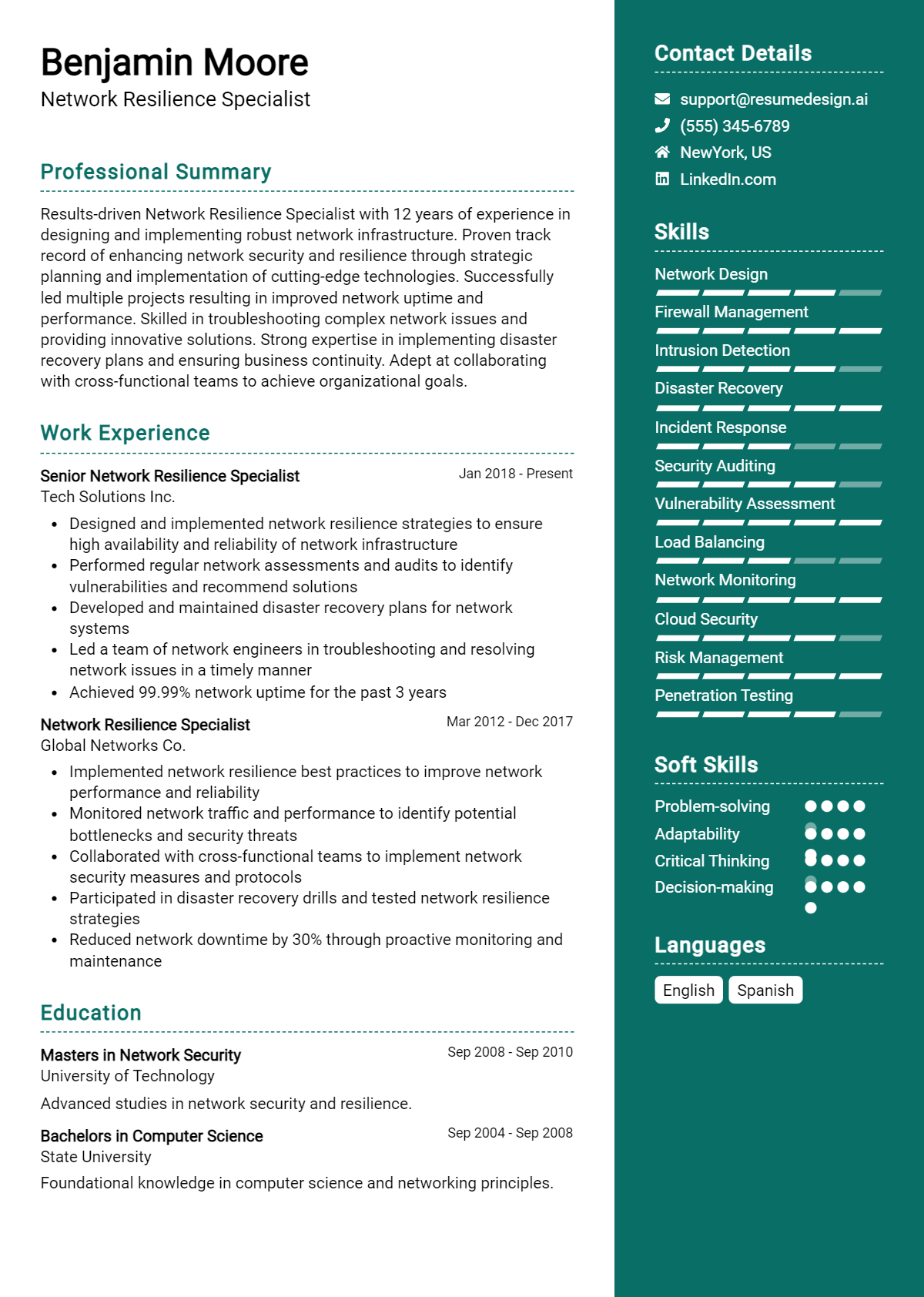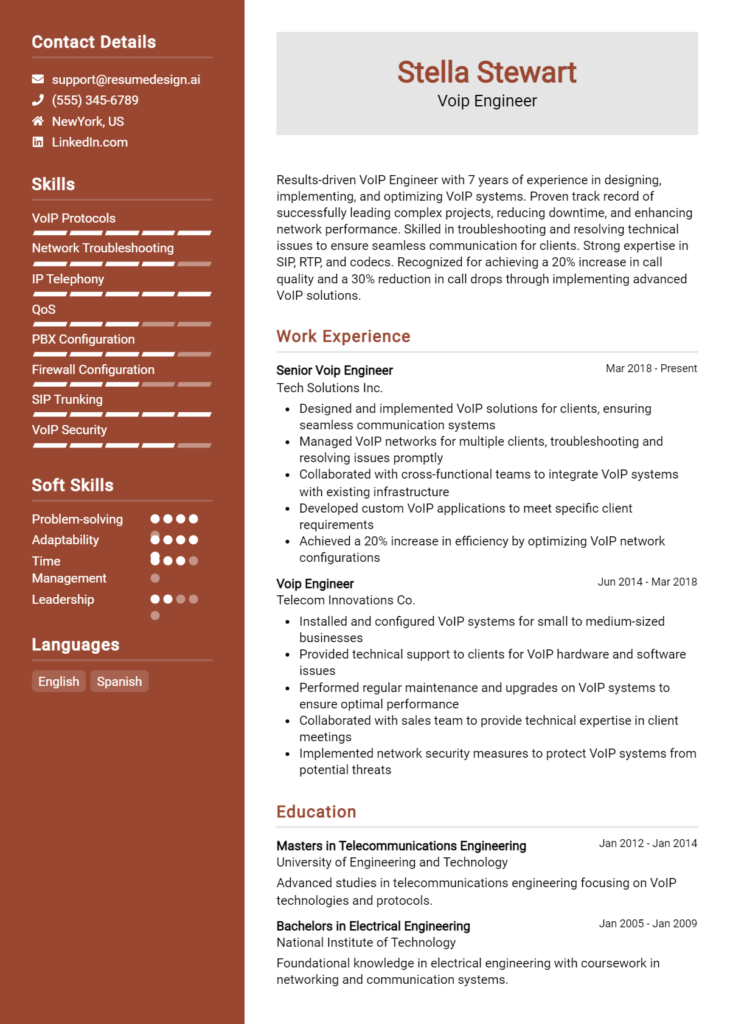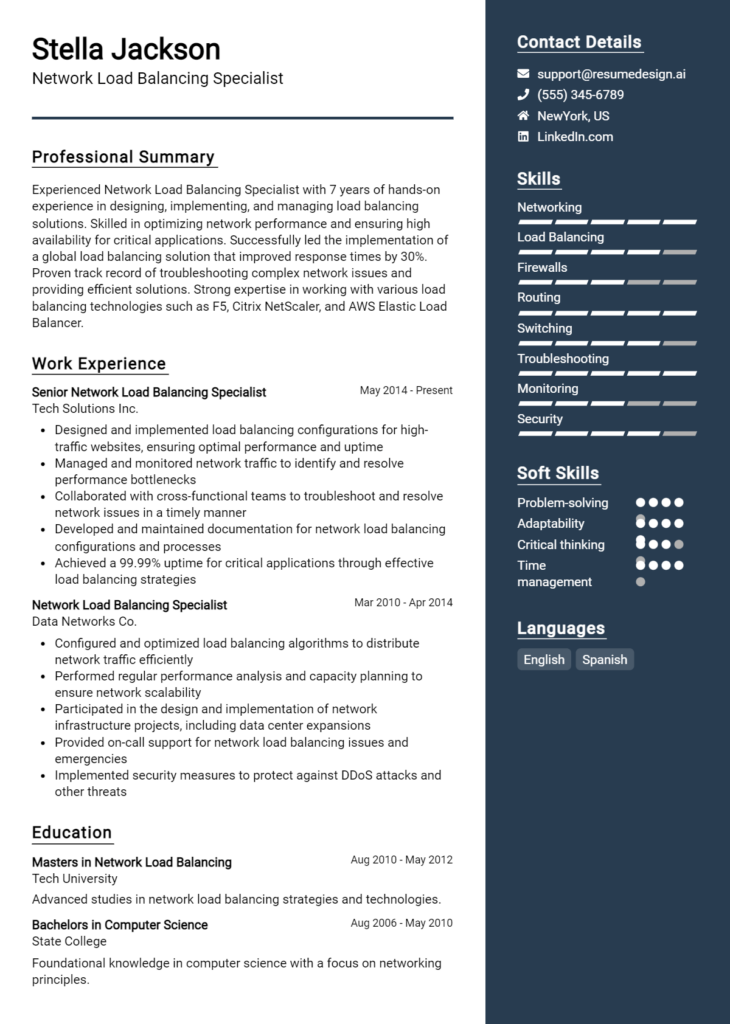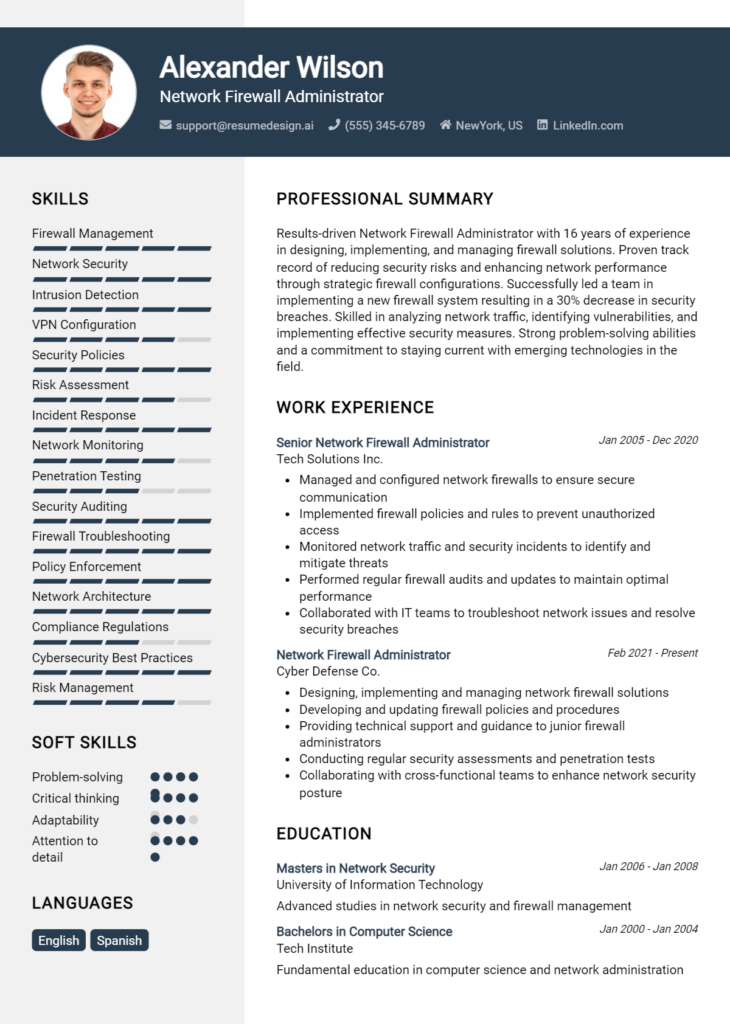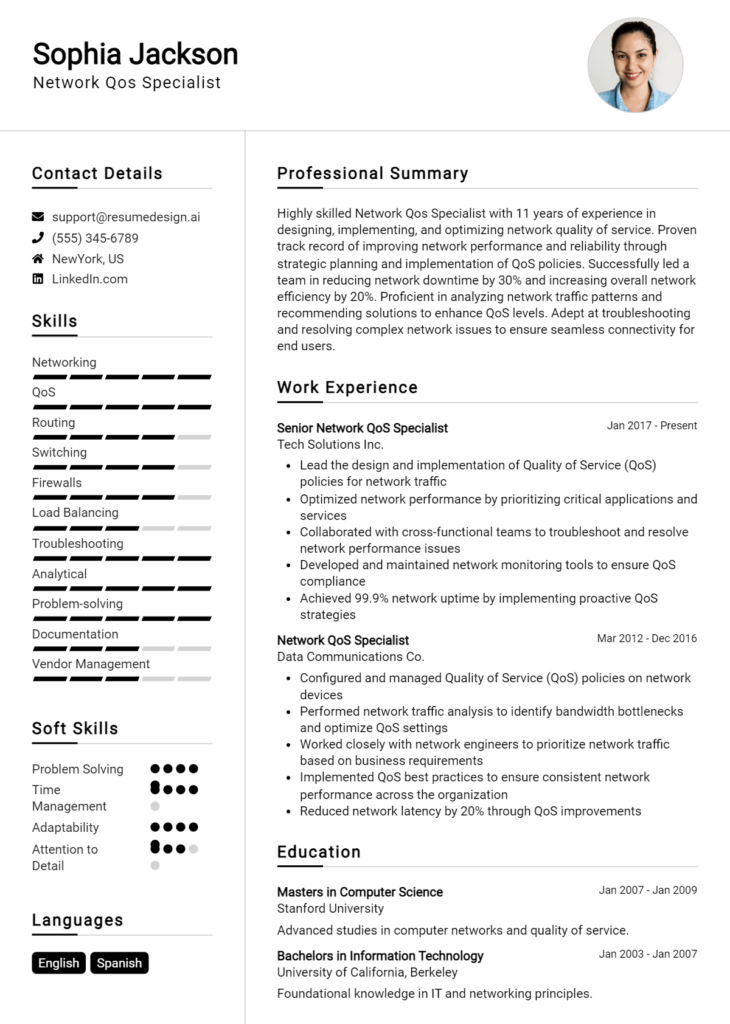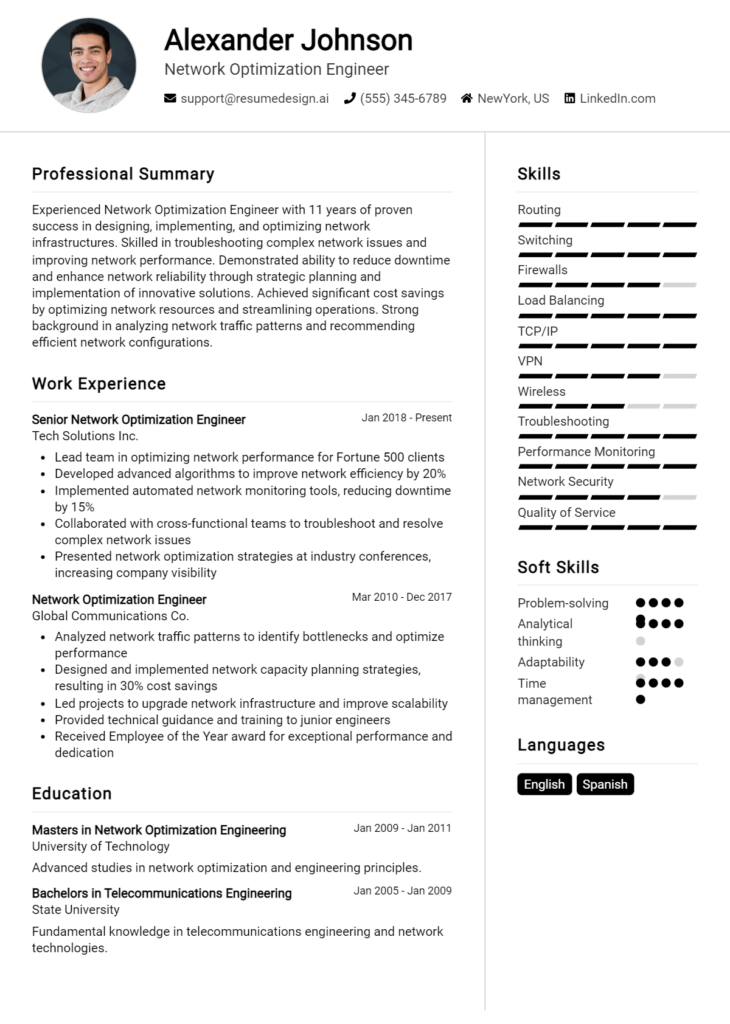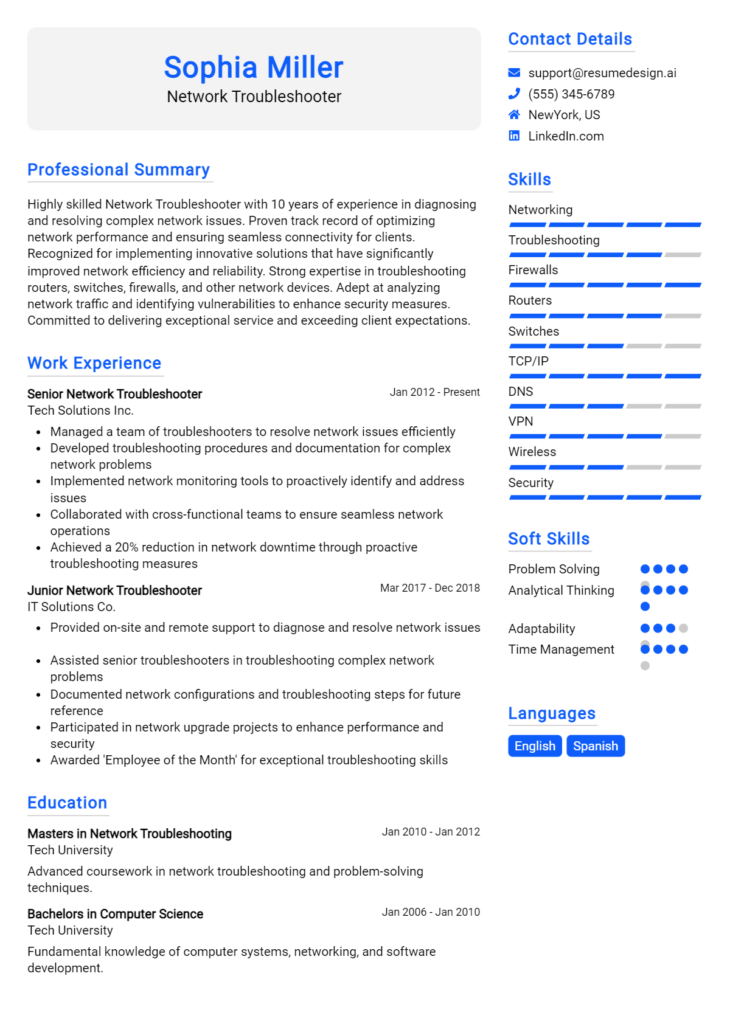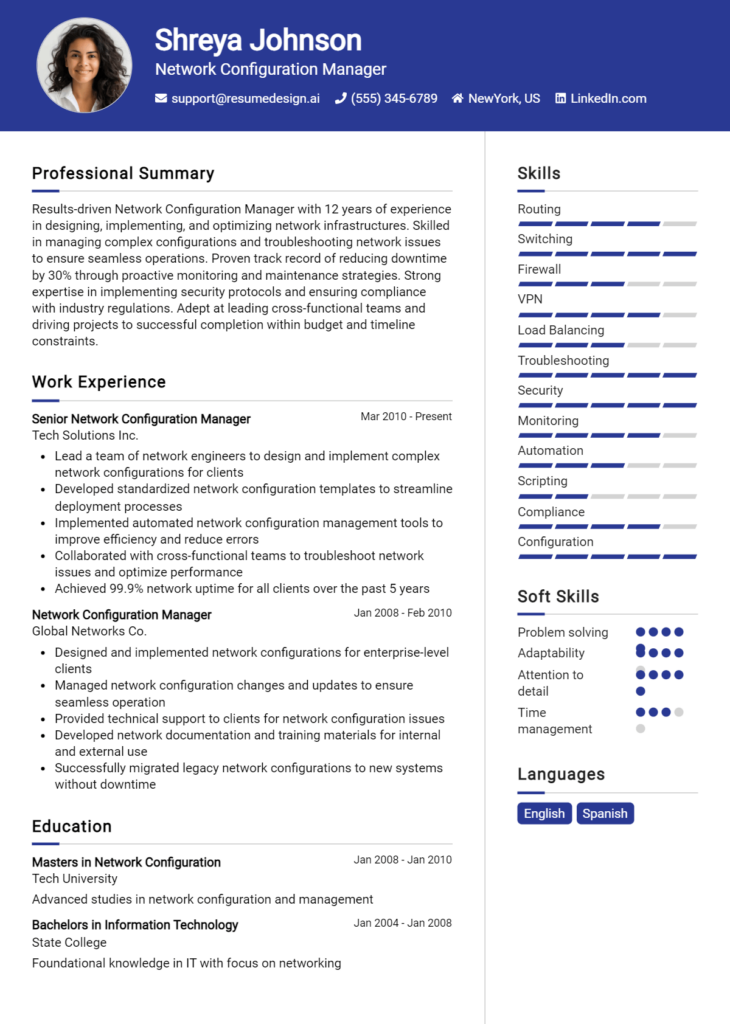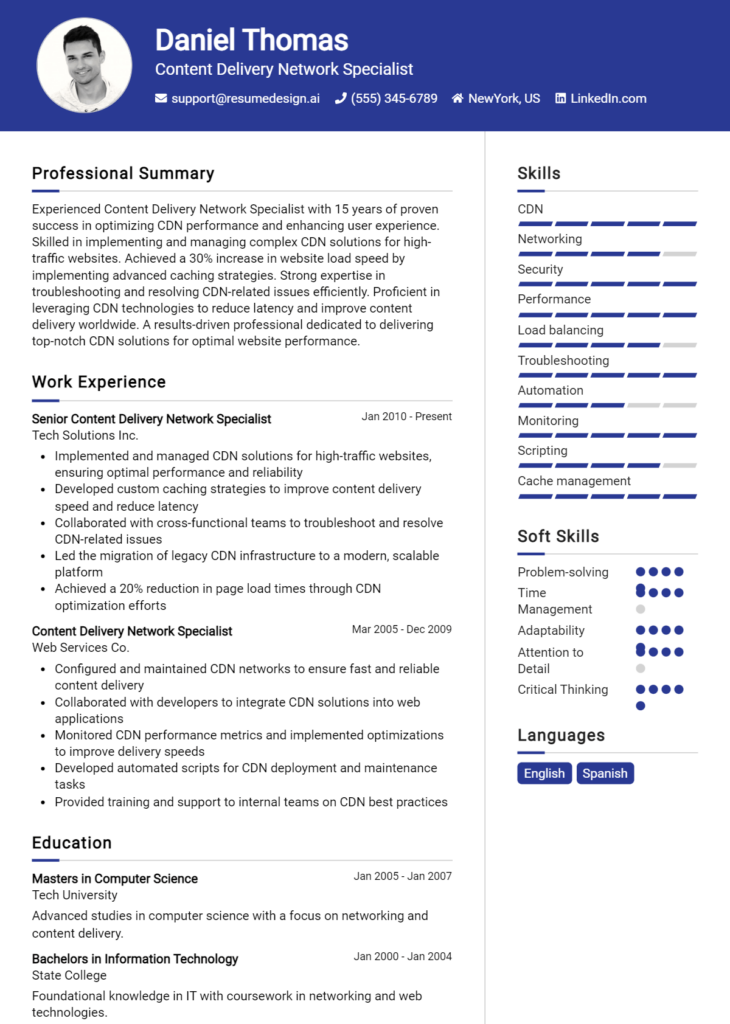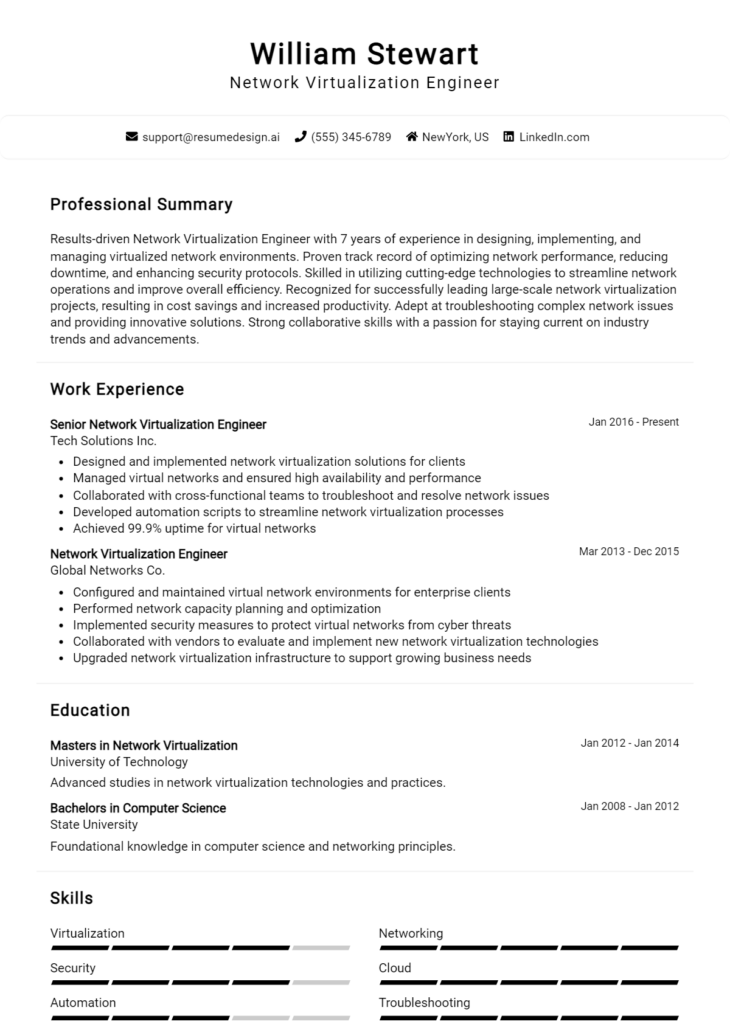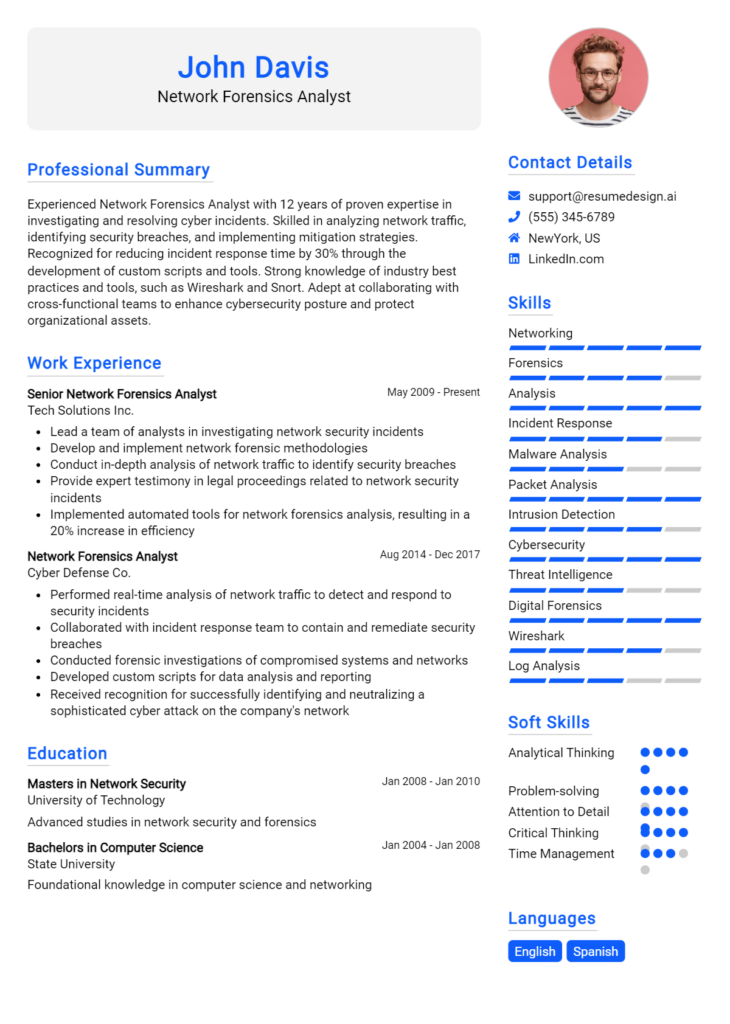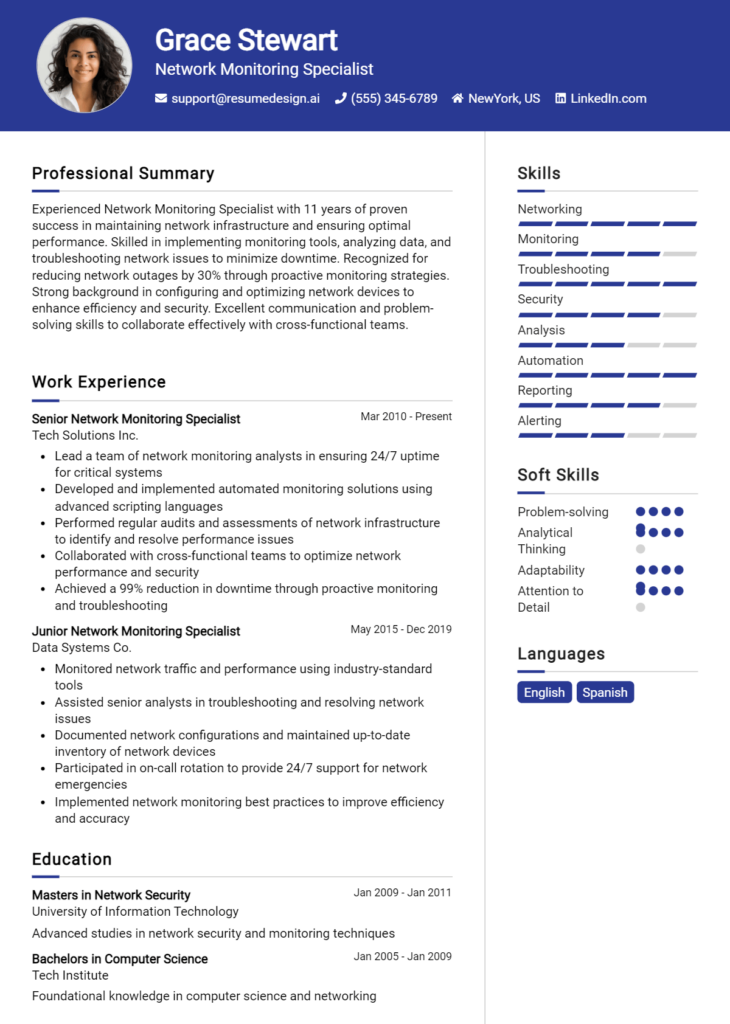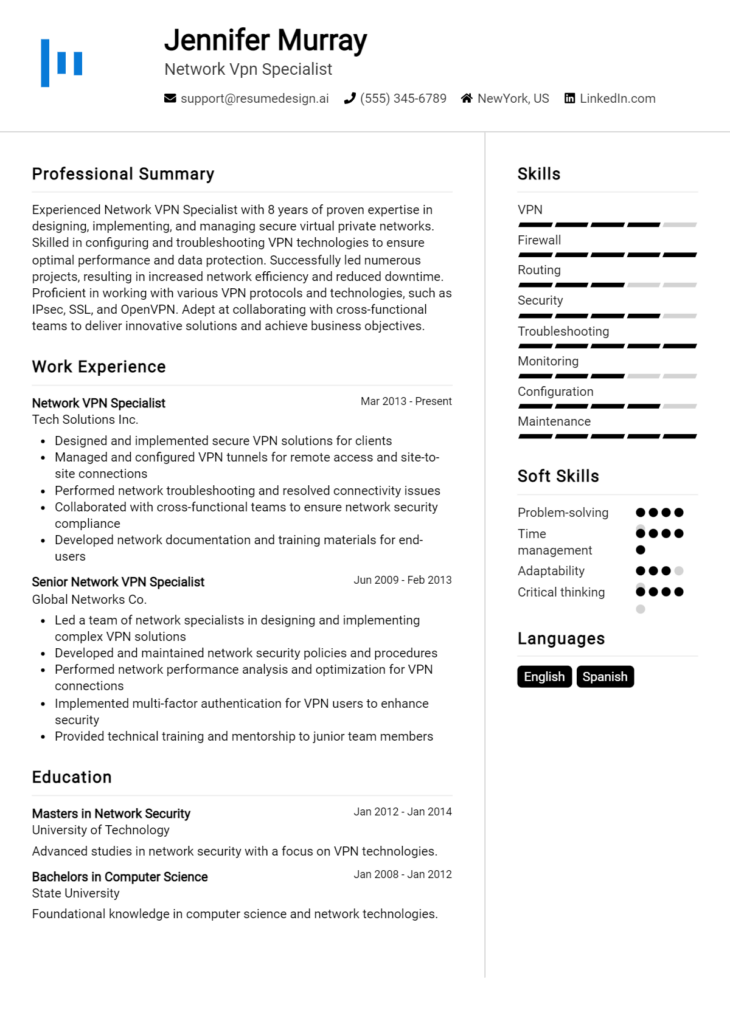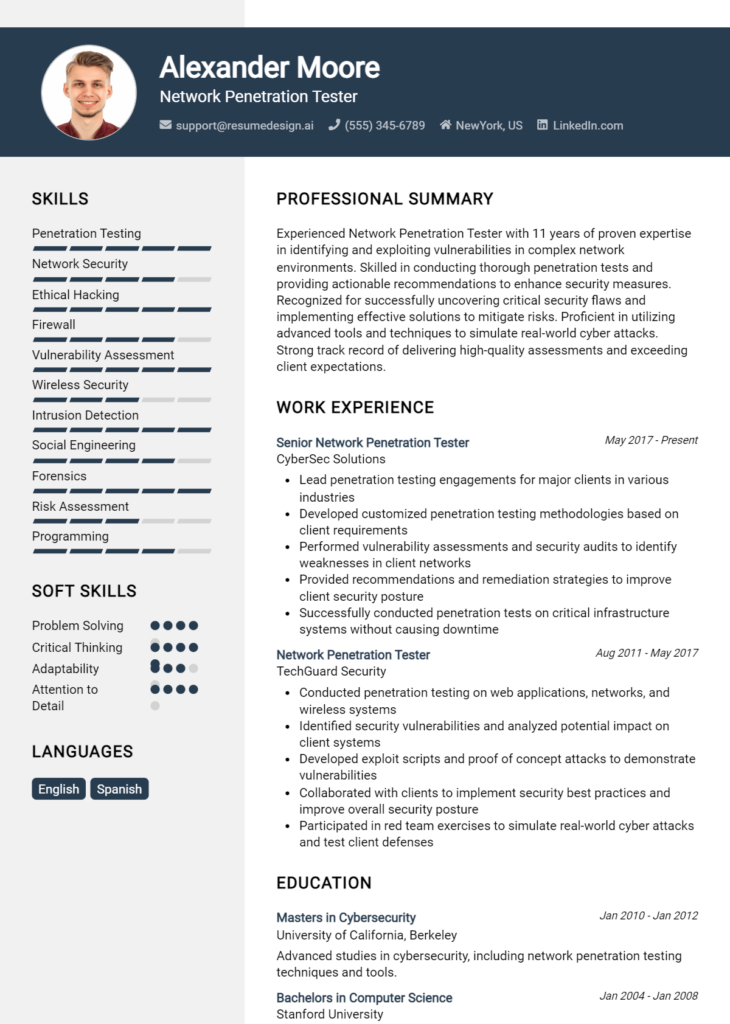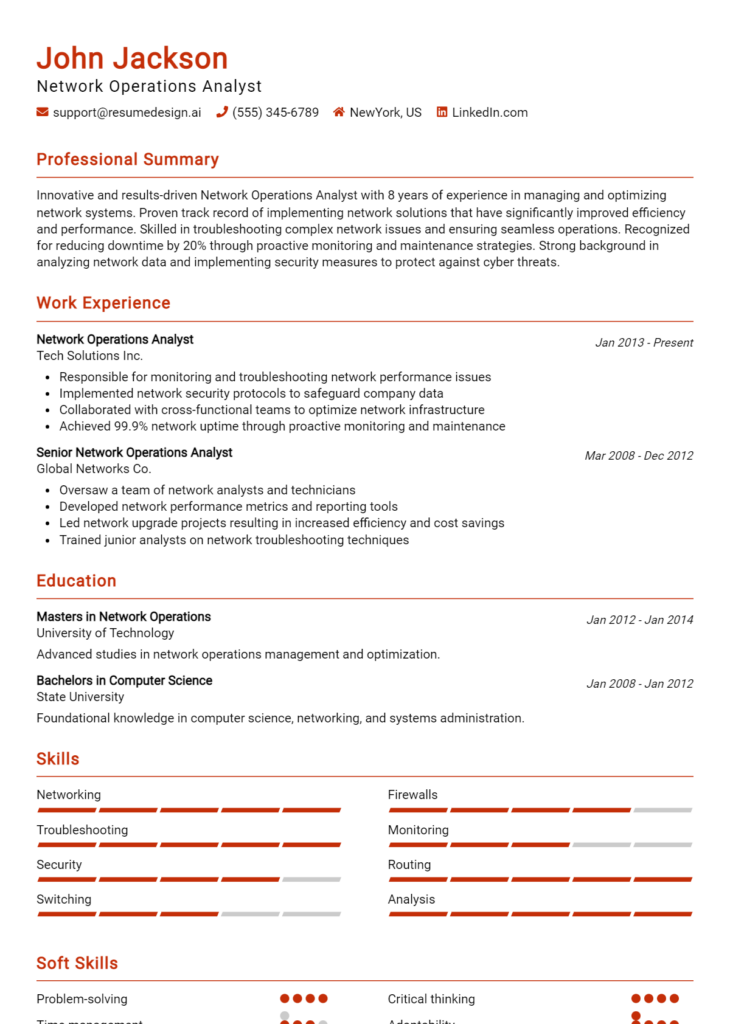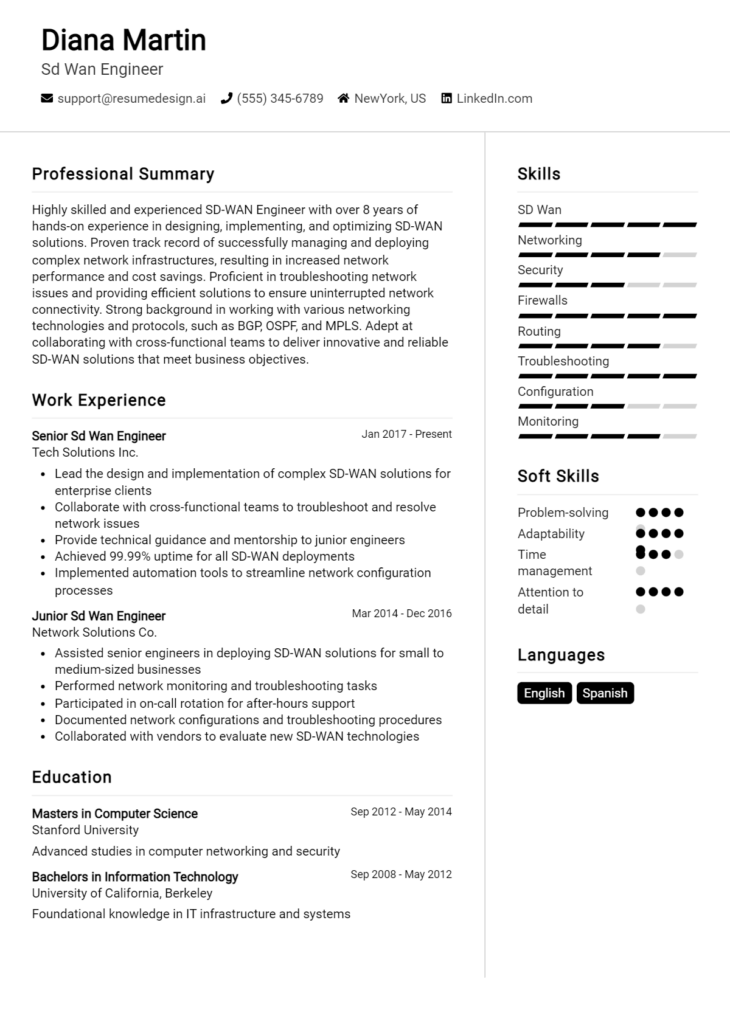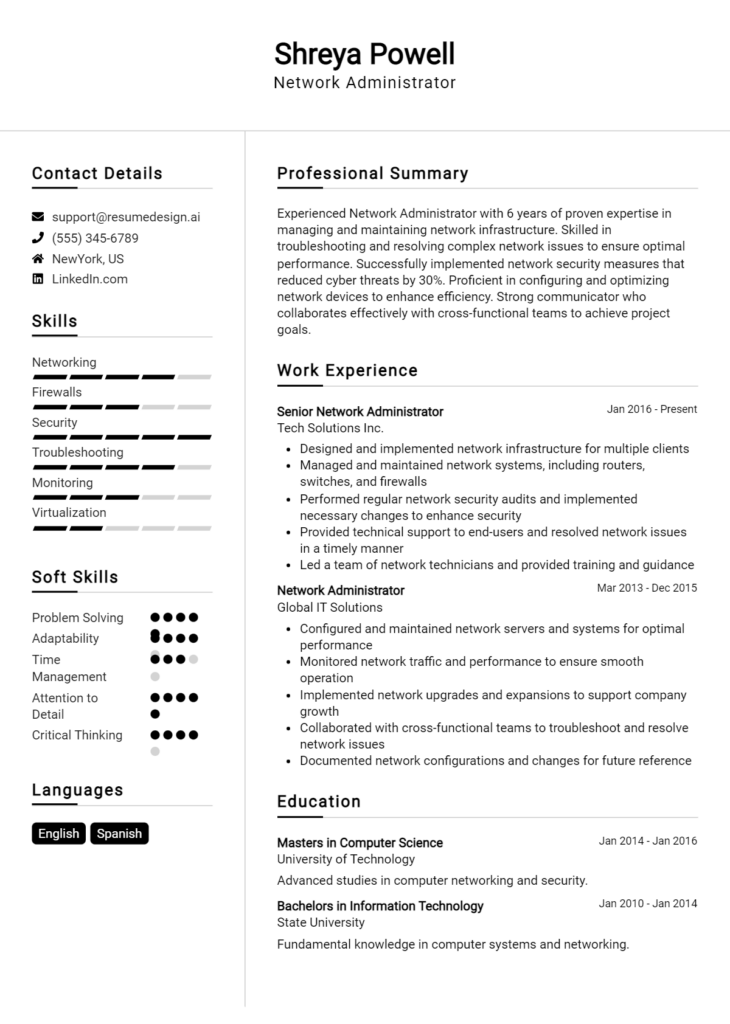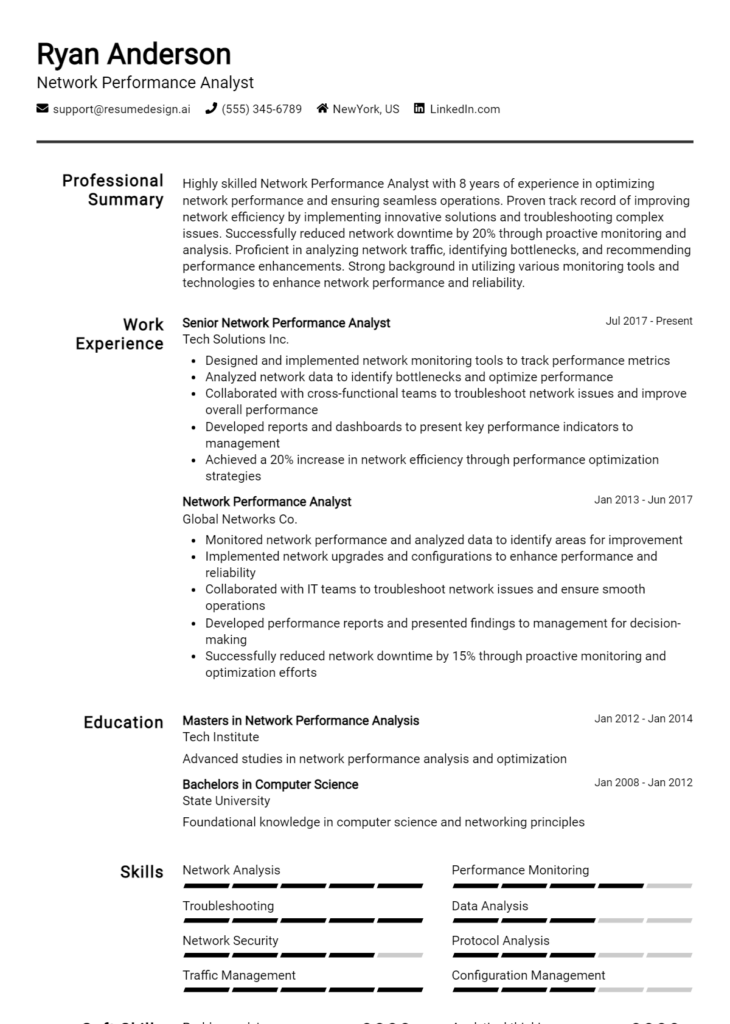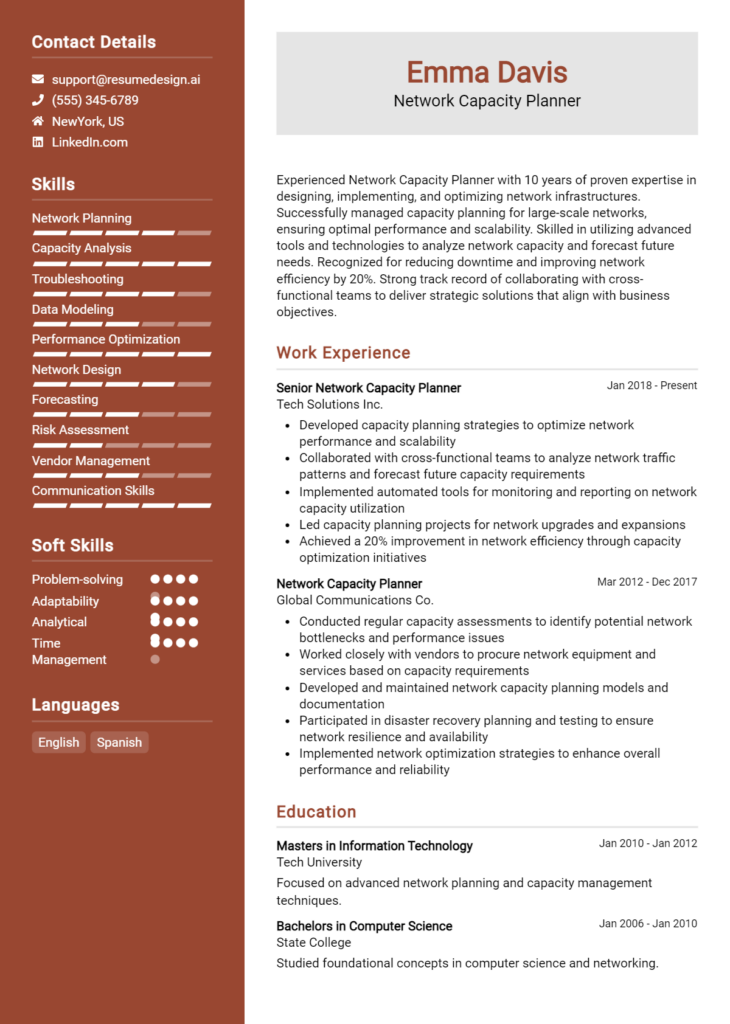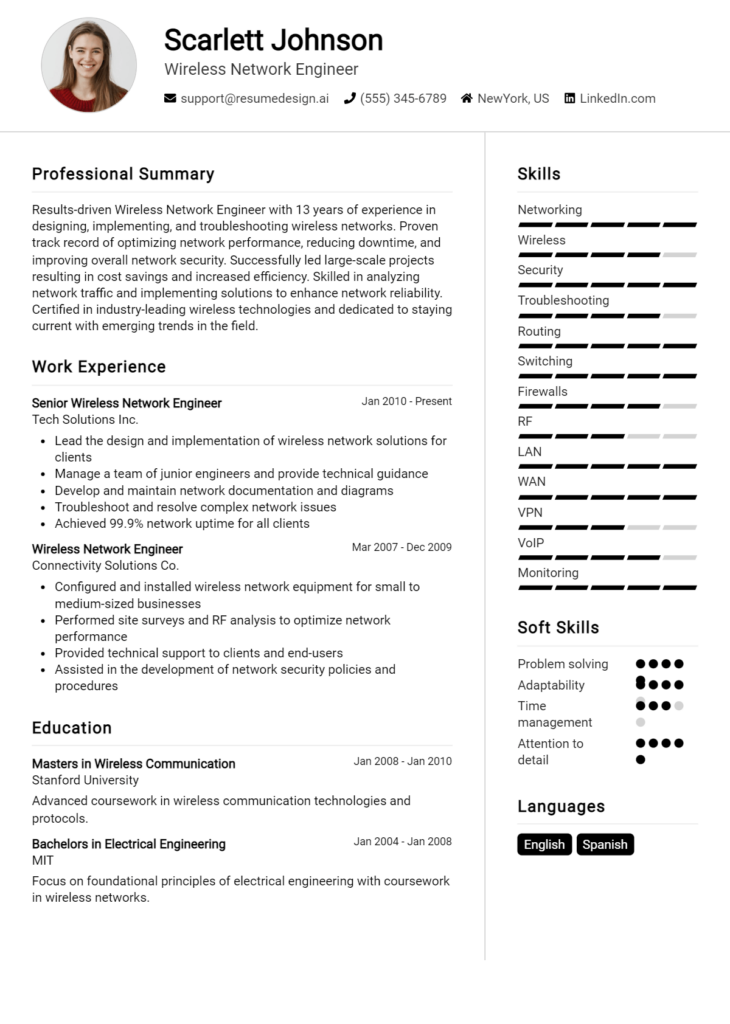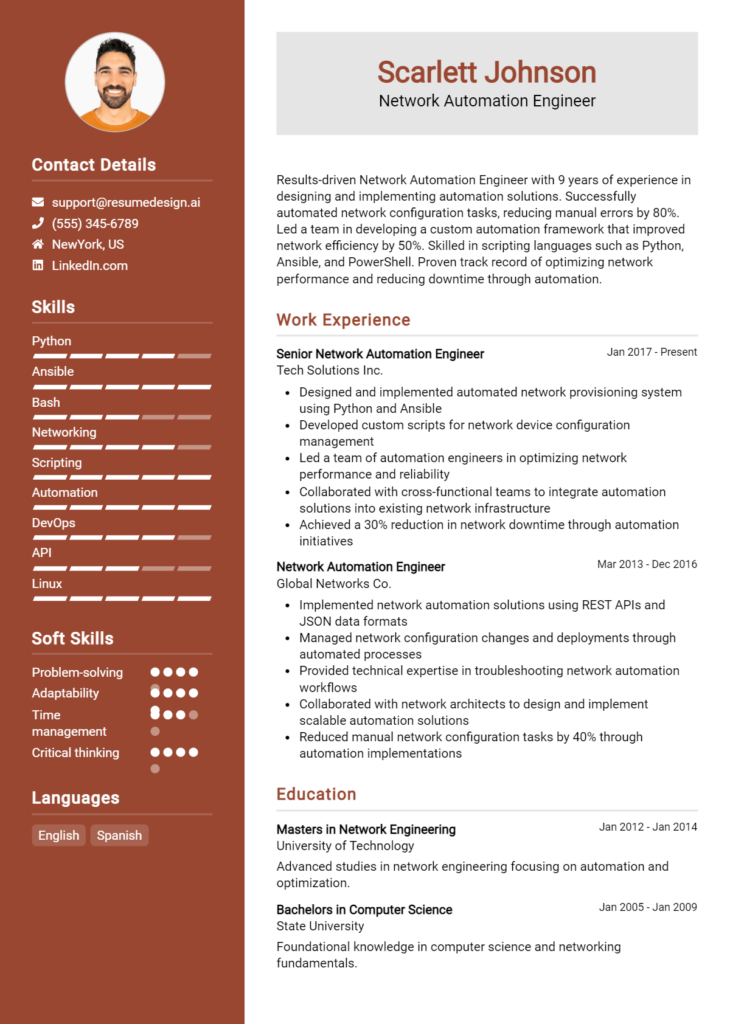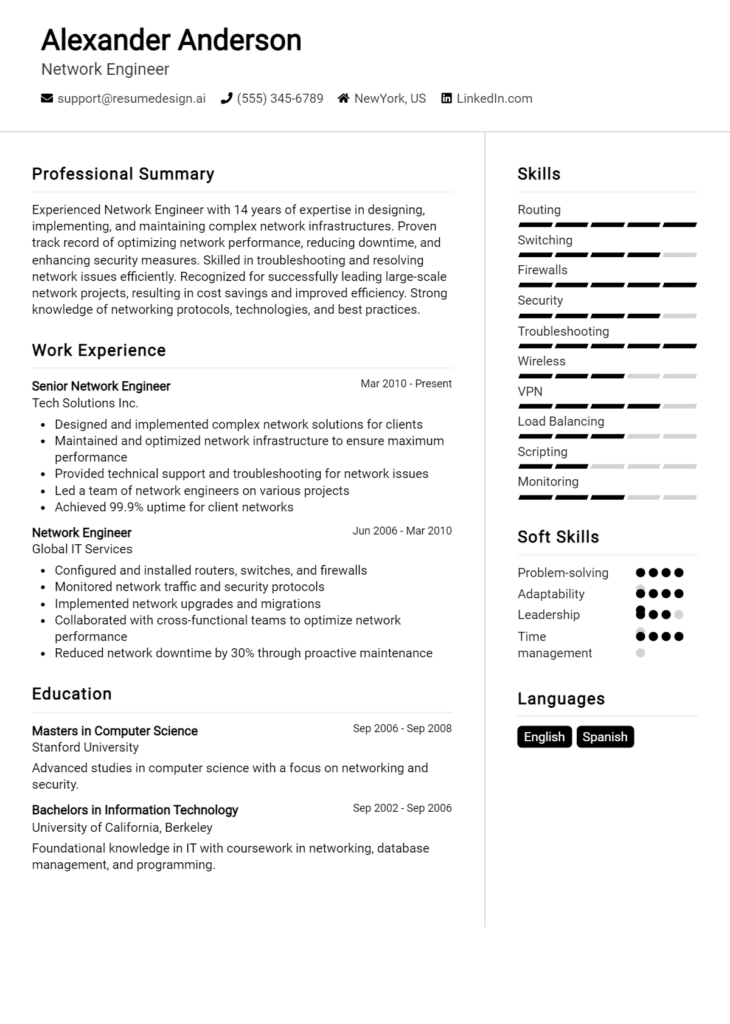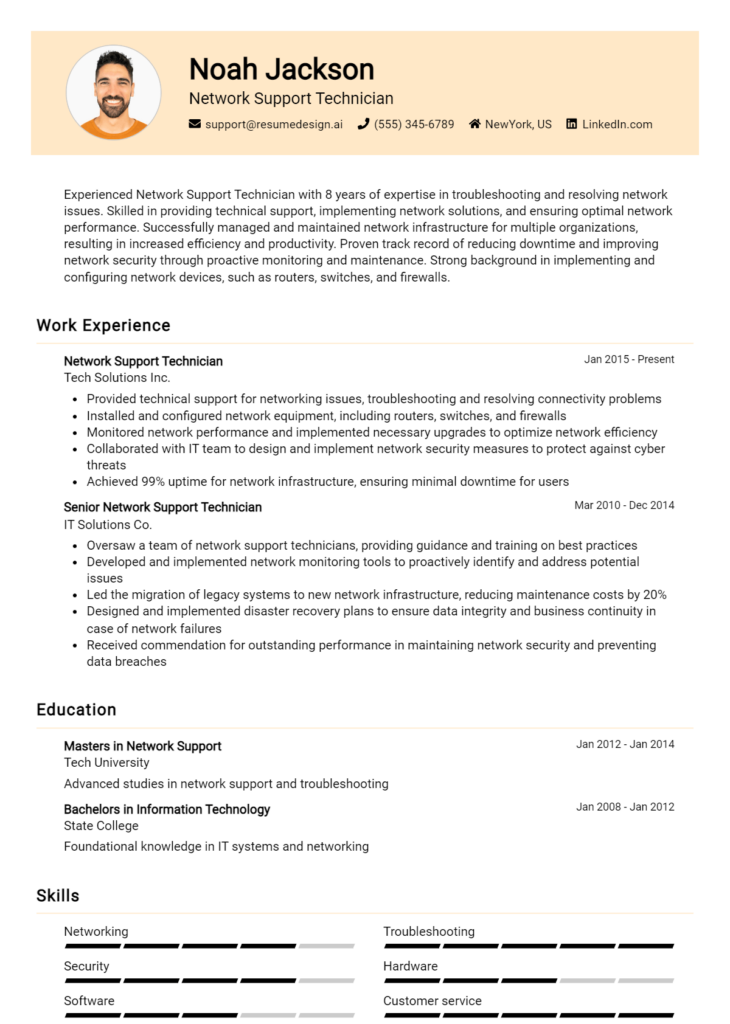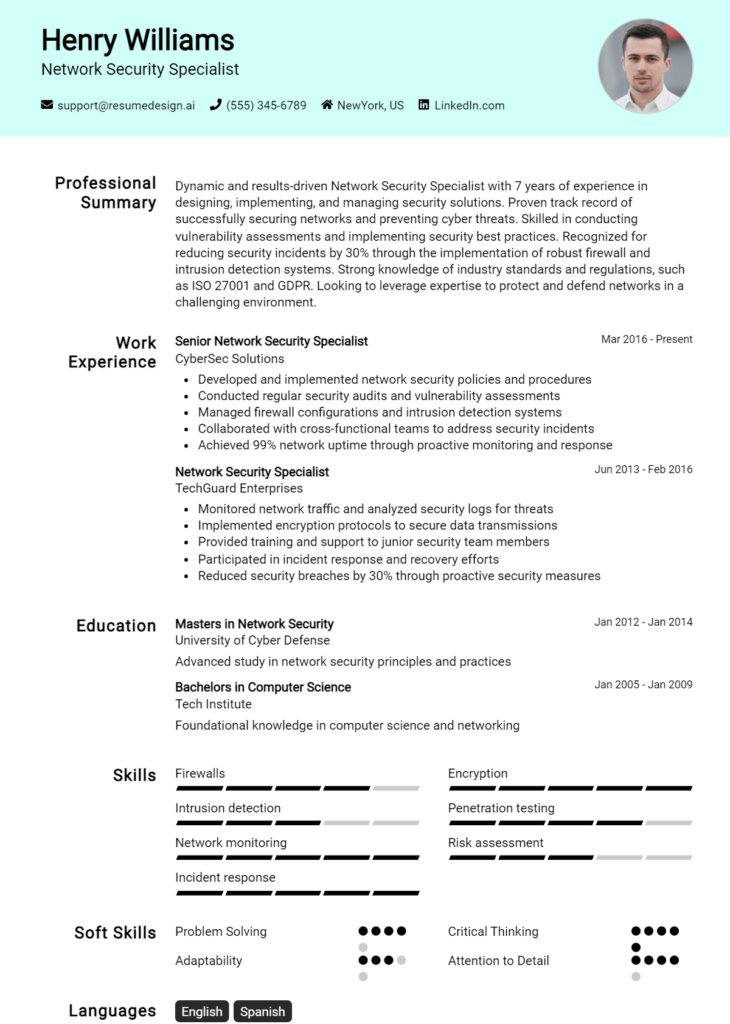Network Resilience Specialist Core Responsibilities
A Network Resilience Specialist plays a crucial role in ensuring the stability and reliability of an organization’s network infrastructure. Key responsibilities include assessing vulnerabilities, implementing redundancy measures, and developing disaster recovery plans. This position demands strong technical expertise, operational knowledge, and exceptional problem-solving skills to effectively collaborate across departments such as IT, cybersecurity, and operations. These competencies are vital in achieving organizational goals, and a well-structured resume can effectively highlight these qualifications to potential employers.
Common Responsibilities Listed on Network Resilience Specialist Resume
- Conducting risk assessments and vulnerability analyses for network systems.
- Designing and implementing network redundancy and failover strategies.
- Developing and maintaining disaster recovery and business continuity plans.
- Monitoring network performance and troubleshooting issues proactively.
- Collaborating with cross-functional teams to enhance network resilience.
- Documenting network architecture and resilience strategies.
- Training staff on best practices for network reliability.
- Conducting regular audits and compliance checks of network systems.
- Evaluating and recommending new technologies for improved resilience.
- Responding to incidents and coordinating recovery efforts effectively.
- Staying updated on industry trends and advancements in network resilience.
High-Level Resume Tips for Network Resilience Specialist Professionals
In the competitive field of network resilience, a well-crafted resume is not just a document; it is your first opportunity to make a lasting impression on potential employers. As a Network Resilience Specialist, your resume should not only showcase your technical skills and knowledge but also reflect your accomplishments and the value you can bring to an organization. A strong resume is critical in articulating your expertise in maintaining and enhancing network reliability, making it essential for standing out in a crowded job market. This guide provides practical and actionable resume tips specifically tailored for Network Resilience Specialist professionals, ensuring that your resume effectively communicates your unique qualifications.
Top Resume Tips for Network Resilience Specialist Professionals
- Tailor your resume to the specific job description by using keywords and phrases that align with the requirements and responsibilities outlined in the posting.
- Highlight relevant experience in network design, implementation, and management, focusing on roles where you ensured system resilience and uptime.
- Quantify your achievements with specific metrics, such as percentage improvements in network availability or reductions in downtime, to provide concrete evidence of your impact.
- Showcase industry-specific skills, such as proficiency in network monitoring tools, incident response strategies, and disaster recovery planning.
- Include certifications that validate your expertise, such as Cisco Certified Network Professional (CCNP), Certified Information Systems Security Professional (CISSP), or ITIL certifications.
- Utilize a clean and professional format that enhances readability, making it easy for hiring managers to quickly identify key information.
- Incorporate strong action verbs to describe your responsibilities and accomplishments, such as "developed," "implemented," and "optimized."
- Emphasize collaboration and communication skills, as network resilience often requires working across various teams and departments.
- Consider adding a summary statement at the top of your resume that encapsulates your experience and goals as a Network Resilience Specialist.
By implementing these tips, you can significantly enhance your resume, making it more compelling and aligned with the expectations of employers in the Network Resilience Specialist field. A well-structured and targeted resume will not only highlight your skills and achievements but also increase your chances of securing interviews and advancing your career in this vital area of networking.
Why Resume Headlines & Titles are Important for Network Resilience Specialist
In the competitive landscape of networking and IT, a Network Resilience Specialist plays a pivotal role in ensuring the stability and reliability of network infrastructure. When crafting a resume for this specialized position, the use of impactful headlines and titles is crucial. A well-crafted headline can immediately capture the attention of hiring managers, offering a succinct summary of the candidate's key qualifications and expertise in just a few words. It should be concise, relevant, and directly aligned with the job being applied for, setting the stage for the rest of the resume and making a strong first impression.
Best Practices for Crafting Resume Headlines for Network Resilience Specialist
- Keep it concise: Aim for one to two impactful phrases.
- Be role-specific: Include terminology and keywords relevant to network resilience.
- Highlight key strengths: Focus on your most significant skills or accomplishments.
- Use active language: Choose strong verbs that convey action and expertise.
- Tailor for each job application: Customize your headline to align with the specific job description.
- Avoid jargon: While industry terms are important, ensure clarity and avoid overly technical language.
- Showcase achievements: If possible, include quantifiable results to enhance credibility.
- Maintain professionalism: Ensure your tone is professional and reflects your expertise.
Example Resume Headlines for Network Resilience Specialist
Strong Resume Headlines
Expert Network Resilience Specialist with 10+ Years in Disaster Recovery Solutions
Dynamic IT Professional Specializing in Network Redundancy and Uptime Optimization
Certified Network Resilience Engineer with Proven Track Record in High-Availability Systems
Strategic Network Resilience Consultant Focused on Risk Mitigation and Business Continuity
Weak Resume Headlines
Experienced in IT
Network Specialist
Seeking Opportunities in Networking
Strong headlines are effective because they provide specific insights into the candidate’s expertise and experience, effectively showcasing their qualifications at a glance. They use targeted language that resonates with hiring managers looking for a Network Resilience Specialist, making them stand out in a crowded field. In contrast, weak headlines fail to impress due to their vagueness and lack of specificity. They do not convey any unique qualifications or strengths, ultimately diminishing the candidate's chances of making a memorable impression.
Writing an Exceptional Network Resilience Specialist Resume Summary
A resume summary is a critical component for a Network Resilience Specialist as it serves as the first impression that captures the attention of hiring managers. A well-crafted summary quickly highlights key skills, relevant experience, and notable accomplishments that align with the specific demands of the role. This concise and impactful section not only sets the tone for the rest of the resume but also increases the likelihood of securing an interview by demonstrating the candidate's suitability for the position right from the start. Tailoring the summary to the job description ensures that it resonates with the hiring team, showcasing the candidate as a strong contender for the role.
Best Practices for Writing a Network Resilience Specialist Resume Summary
- Start with a strong opening statement that outlines your professional title and years of experience.
- Quantify achievements to provide concrete evidence of your impact, such as improvements in network uptime or performance metrics.
- Highlight relevant skills that are directly related to network resilience, such as disaster recovery planning, risk assessment, and incident response.
- Use industry-specific keywords from the job description to ensure your summary passes applicant tracking systems.
- Keep it concise, ideally between 3 to 5 sentences, to maintain the reader's attention.
- Focus on your most impressive accomplishments and skills that set you apart from other candidates.
- Tailor your summary for each application to align with the specific requirements and responsibilities of the job.
- Conclude with a statement that expresses your commitment to enhancing network resilience and overall organizational success.
Example Network Resilience Specialist Resume Summaries
Strong Resume Summaries
Dynamic Network Resilience Specialist with over 7 years of experience in developing and implementing robust disaster recovery plans. Successfully reduced network downtime by 40%, enhancing operational efficiency for a Fortune 500 company. Proficient in risk assessment and incident response, with a proven track record of safeguarding critical infrastructure.
Results-driven professional with expertise in network design and resilience strategies, possessing a solid background in both IT management and cybersecurity. Led a team that achieved a 30% improvement in system recovery times, ensuring business continuity and client trust. Certified in ITIL and CCNP, with a deep understanding of regulatory compliance.
Network Resilience Specialist with a decade of experience in optimizing network reliability across diverse environments. Instrumental in implementing a multi-layered risk mitigation strategy that resulted in a 50% decrease in service interruptions. Strong analytical skills complemented by hands-on experience in cloud solutions and virtualized infrastructures.
Weak Resume Summaries
Experienced IT professional looking for a position in network resilience. I have a solid background and skills that might be useful.
Network specialist with a general understanding of network issues and resilience. I have worked in various roles and am interested in enhancing my career.
The strong resume summaries are considered effective because they provide specific details about achievements, quantify results, and directly relate to the responsibilities of a Network Resilience Specialist. They emphasize relevant skills and experiences that demonstrate the candidate's value to potential employers. In contrast, the weak summaries lack specificity and measurable outcomes, making them appear generic and uninspiring. They fail to convey the candidate's unique value proposition, which diminishes their chances of attracting the attention of hiring managers.
Work Experience Section for Network Resilience Specialist Resume
The work experience section of a Network Resilience Specialist resume is pivotal in demonstrating a candidate's technical prowess and leadership abilities. This section not only highlights the candidate's familiarity with critical networking technologies and methodologies but also showcases their capacity to manage teams effectively and deliver high-quality products that enhance network reliability. By quantifying achievements and aligning experiences with industry standards, candidates can present a compelling narrative that illustrates their value to potential employers.
Best Practices for Network Resilience Specialist Work Experience
- Clearly quantify achievements using metrics such as percentage improvements, cost savings, or reduced downtime.
- Focus on specific technical skills relevant to network resilience, such as fault tolerance, redundancy planning, and disaster recovery.
- Demonstrate leadership by highlighting team management experiences and successful project completions.
- Use industry-standard terminology to ensure alignment with job descriptions and expectations.
- Include examples of collaboration with cross-functional teams to emphasize communication skills and teamwork.
- Tailor each experience to showcase how it directly relates to the role of a Network Resilience Specialist.
- Highlight any certifications or training that bolster technical expertise in networking and resilience strategies.
- Ensure that each bullet point is action-oriented and starts with strong verbs to convey a sense of initiative and impact.
Example Work Experiences for Network Resilience Specialist
Strong Experiences
- Led a cross-functional team in implementing a network redundancy plan that resulted in a 40% reduction in system downtime over six months.
- Designed and executed a disaster recovery strategy for a major client, achieving a recovery time objective (RTO) of under 4 hours, surpassing industry standards.
- Developed and deployed advanced monitoring systems that improved network performance metrics by 30%, enhancing overall service quality.
- Managed a project that upgraded legacy systems to next-generation technologies, reducing operational costs by 25% while improving reliability.
Weak Experiences
- Worked on various networking projects with no specific details on outcomes or responsibilities.
- Involved in team meetings and discussions without highlighting any significant contributions or results.
- Assisted in troubleshooting network issues without specifying the impact of the assistance provided.
- Participated in training sessions related to networks without mentioning any certifications or practical applications.
The examples of strong experiences are considered effective because they provide clear, quantifiable outcomes and demonstrate leadership and technical expertise in practical contexts. They highlight specific contributions and achievements that align well with the core responsibilities of a Network Resilience Specialist. Conversely, the weak experiences lack detail and measurable results, making it difficult for potential employers to gauge the candidate's impact or relevance to the position.
Education and Certifications Section for Network Resilience Specialist Resume
The education and certifications section of a Network Resilience Specialist resume is crucial for presenting a candidate's academic background and professional qualifications. This section not only showcases the formal education obtained but also highlights industry-relevant certifications and ongoing learning efforts. By providing detailed information about relevant coursework, specialized training, and recognized credentials, candidates can greatly enhance their credibility and demonstrate their alignment with the job role. Employers often seek individuals who not only possess theoretical knowledge but also practical skills and up-to-date certifications that reflect the latest industry standards.
Best Practices for Network Resilience Specialist Education and Certifications
- Prioritize relevant degrees such as Computer Science, Information Technology, or Network Engineering.
- Include industry-recognized certifications like Cisco Certified Network Professional (CCNP) and Certified Information Systems Security Professional (CISSP).
- Detail specific coursework that aligns with network resilience and cybersecurity principles.
- Highlight any ongoing education, such as workshops, online courses, or webinars relevant to network resilience.
- Be specific about the level of certification (e.g., Associate, Professional, Expert) to indicate expertise.
- Consider including certifications from reputable organizations like CompTIA, ISACA, or (ISC)².
- Use clear formatting to ensure easy readability and accessibility of information.
- Regularly update this section to reflect new qualifications and relevant training experiences.
Example Education and Certifications for Network Resilience Specialist
Strong Examples
- Bachelor of Science in Computer Science, University of Technology, Graduated May 2020
- Cisco Certified Network Professional (CCNP), Achieved June 2022
- Certificate in Network Security from the Institute of Cybersecurity, Completed December 2021
- Coursework in Advanced Network Resilience Techniques, Online Learning Platform, Completed March 2023
Weak Examples
- Associate Degree in General Studies, Community College, Graduated June 2019
- Certification in Basic Computer Skills, Completed January 2018
- Diploma in Office Administration, Obtained December 2020
- Outdated Cisco Certified Network Associate (CCNA), Achieved May 2015
The strong examples are considered relevant and impactful as they directly align with the requirements for a Network Resilience Specialist, showcasing both advanced education and certifications that validate specialized knowledge. In contrast, the weak examples lack relevance to the job role, featuring outdated or non-specialized qualifications that do not demonstrate the candidate's capability in network resilience or related fields.
Top Skills & Keywords for Network Resilience Specialist Resume
When crafting a resume for a Network Resilience Specialist position, highlighting the right skills is crucial to stand out in a competitive job market. A well-rounded skill set not only showcases your technical expertise but also reflects your ability to adapt and thrive in dynamic environments. Employers look for candidates who possess a blend of hard and soft skills that demonstrate both proficiency in network management and the ability to collaborate effectively within teams. By emphasizing these skills, you can illustrate your potential to contribute to the stability and reliability of network infrastructures, ensuring seamless operations and minimizing downtime.
Top Hard & Soft Skills for Network Resilience Specialist
Soft Skills
- Problem-solving
- Critical thinking
- Communication
- Team collaboration
- Adaptability
- Attention to detail
- Time management
- Leadership
- Customer service orientation
- Conflict resolution
Hard Skills
- Network architecture design
- Cybersecurity protocols
- Infrastructure monitoring tools
- Disaster recovery planning
- Virtualization technologies
- Performance optimization
- Network troubleshooting
- Cloud services management
- Scripting languages (Python, Bash)
- Knowledge of network protocols (TCP/IP, BGP, OSPF)
By integrating these skills into your resume, alongside your work experience, you can effectively position yourself as a qualified candidate for the role of Network Resilience Specialist.
Stand Out with a Winning Network Resilience Specialist Cover Letter
As a dedicated Network Resilience Specialist with over five years of experience in designing and implementing robust network infrastructures, I am excited to apply for the position at [Company Name]. My background in network engineering, combined with my commitment to ensuring seamless connectivity and minimizing downtime, positions me uniquely to contribute to your organization’s success. I have a proven record in deploying advanced network solutions, conducting risk assessments, and developing comprehensive disaster recovery plans that align with best practices and industry standards.
In my previous role at [Previous Company Name], I led a team that successfully upgraded our network system, enhancing resilience by over 30%. By leveraging cutting-edge technologies such as SD-WAN and network segmentation, we not only improved performance but also fortified our defenses against potential cyber threats. My proactive approach to identifying vulnerabilities allowed me to implement strategic measures that reduced incident response times by 40%, ensuring uninterrupted service delivery and customer satisfaction.
Collaboration and communication are key components of a successful network resilience strategy, and I pride myself on my ability to work cross-functionally with diverse teams. I have successfully conducted training sessions for staff on best practices for network security and resilience, fostering a culture of awareness and preparedness. I am eager to bring this collaborative spirit to [Company Name] and help build a resilient network that supports your operational goals and enhances overall business continuity.
I am particularly drawn to this opportunity at [Company Name] because of your commitment to innovation and excellence in network solutions. I am enthusiastic about the possibility of contributing my skills and experience to your team, ensuring that your network infrastructure remains resilient in the face of evolving challenges. Thank you for considering my application. I look forward to the opportunity to discuss how I can contribute to your esteemed organization.
Common Mistakes to Avoid in a Network Resilience Specialist Resume
When crafting a resume for a Network Resilience Specialist position, it's crucial to present your skills and experiences in a way that highlights your expertise in maintaining and improving network reliability. However, many candidates make common mistakes that can undermine their chances of standing out. Understanding these pitfalls can help you create a more effective and compelling resume that resonates with hiring managers.
Failing to Tailor the Resume: Sending a generic resume can be detrimental. Customize your resume for each job application to reflect the specific skills and experiences relevant to the position.
Neglecting Technical Skills: Network Resilience Specialists need to showcase their technical competencies. Omitting critical skills like network monitoring tools, redundancy protocols, or disaster recovery techniques can leave a gap in your qualifications.
Overloading with Jargon: While it’s important to demonstrate technical knowledge, using too much industry jargon can alienate hiring managers who may not be as familiar with specific terms. Strive for clarity and balance.
Ignoring Achievements: Simply listing job responsibilities lacks impact. Highlight specific achievements and quantify your contributions, such as improvements in uptime or reductions in downtime.
Inadequate Experience Description: Network resilience roles often require a nuanced understanding of past positions. Provide detailed descriptions of your roles, focusing on relevant projects and the outcomes achieved.
Using Passive Language: A resume that employs passive language can come across as weak. Use active verbs to convey your contributions and impact more effectively.
Overlooking Soft Skills: While technical skills are paramount, soft skills such as communication, teamwork, and problem-solving are equally important. Make sure to include examples that demonstrate these abilities.
Failing to Proofread: Errors in grammar, spelling, or formatting can create a negative impression. Always proofread your resume multiple times or seek feedback from others to ensure it is polished and professional.
Conclusion
In this article, we explored the crucial role of a Network Resilience Specialist, highlighting the skills and qualifications necessary for success in this field. Key responsibilities include ensuring network stability, implementing redundancy measures, and responding swiftly to incidents that could disrupt service. We also discussed the importance of continuous learning and staying updated with the latest technologies and best practices to effectively manage and enhance network resilience.
As you reflect on your career as a Network Resilience Specialist, it's essential to ensure that your resume accurately showcases your expertise and experience. A well-crafted resume can significantly enhance your chances of landing that desired position.
To assist you in this process, we recommend utilizing various available resources. Check out resume templates to find a layout that fits your style, or use the resume builder for an easy, guided approach to create a professional resume. Additionally, exploring resume examples can provide inspiration and insights into how to effectively present your skills. Don’t forget about the importance of a strong introduction; consider using cover letter templates to complement your resume and make a lasting impression.
Take action today by reviewing and updating your resume to reflect your qualifications as a Network Resilience Specialist. Your next opportunity could be just around the corner!

